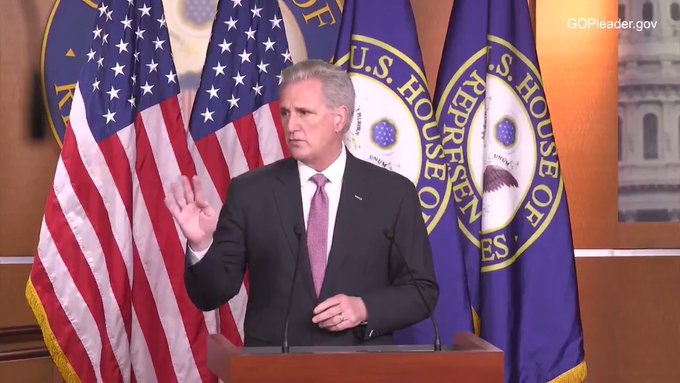McCarthy: Pelosi Offered “Outright Lie” About Credit For Coronavirus Relief Bill

Clearly, all is not forgiven on Capitol Hill. Ever since she upended negotiations over the coronavirus relief bill, Nancy Pelosi has attempted to take credit for its final version. Earlier today, Pelosi claimed her “jiu jitsu” transformed the effort from a corporate bailout to a “workers first” rescue:
“We have the legislation that will come to the floor tomorrow. I anticipate, I feel certain we will have a strong bipartisan vote. We take some pride in the fact,” the California Democrat said at the Capitol during her weekly press briefing.Pelosi — who turned 80 Thursday — said Democrats had to perform “jiu jitsu” on the Republicans’ initial proposal, which she said favored corporations over workers.“We did jiu jitsu on it. It went from a corporate-first proposal that the Republicans put forth in the Senate to a workers-first — Democratic workers-first legislation,” she said.
“Jiu jitsu”? More like Hong Kong phooey, McCarthy said. The only changes that took place to the bill when Pelosi belatedly injected herself into the negotiations had nothing to do with coronavirus relief.
Speaker Pelosi just claimed she did "jiu jitsu" to change the coronavirus legislation. That is an outright lie.
The fundamental parts of the bill have not changed since Sunday, including:
• 4 months for unemployment insurance
• Forgiveness for small business loans
7,208 people are talking about this
REP. MCCARTHY: A few minutes ago the Speaker stood at the podium and claimed that House Democrats did what she called jiu-jitsu to change the bill. That is an outright lie. The fundamental portion of this bill has not changed since Sunday. Four months for unemployment was already decided on Sunday. The grant to keep employees hired by small businesses was decided on Sunday. The only few additions were funding of things that had nothing to do with the coronavirus. Was that worth holding it up and more people being laid off? More people losing sleep? More people wondering if they can continue? Those are the type of games that have to stop in Washington.
McCarthy’s got a point, of course, but this is nothing new, except for the high profile on this bill. It’s just another sunny day in Congress, where 535 people try to take full and sole credit for any success and failure’s the fault of the other side. McCarthy’s ire is particularly stoked over Pelosi’s last-minute intervention designed to grab credit for the agreement when she’d spent the past week outside of DC and the negotiations, which makes his annoyance with Pelosi’s grandstanding today completely understandable.
In exchange for that, though, Pelosi will now have no choice but push the bill through to passage tomorrow, or Saturday morning at the latest. That’s the flip side of taking ownership, and Pelosi knows it. No one really believes her when she claims that her “jiu jitsu” produced the agreement, but everyone knows she’s now on the hook for passing the bill, and fast.
All this serves to remind us that Congress is a largely dysfunctional institution that occasionally manages to work well enough to produce something in a crisis. As I wrote in my column at The Week, the final version of the $2.2 trillion bill probably matters less in the long run than the fact that elected officials managed to produce anything at all. This kind of grandstanding and sharp rebukes doesn’t promise much cooperation on later fine-tuning, however:
In this situation, the parameters of this massive relief package matters less than Congress’ credibility in dealing with a crisis. Thus far, the response has been far from confidence building, especially with an electorate whose faith in institutions had fallen sharply over the previous few years. Voters expect Congress to act in a crisis, not get stalled by partisan bickering and then literal absence. A failure to act here could have enormous political as well as economic consequences and call the whole idea of a co-equal legislature into question. …Thus far the broad strokes look fairly focused and calibrated reasonably well on the immediate problems, but this is such an unprecedented situation that certainty is simply not possible. At this point, the nation needs to take action to prevent panic and despair from turning a short-term problem into a long-term disaster. A functional Congress and White House can fine tune the approach as it goes, adding to what works and shifting resources away from what does not.In order for that to succeed, Congress has to become functional again and re-instill confidence in its ability to deal with crises. This agreement may not be perfect, and it may not even be great, but inaction and gridlock would be far worse than whatever problems this agreement might cause down the road. Voters are watching intently to see whether they can trust our public institutions at all, and the consequences of their failure at this junction might be far worse than the virus or the economic damage it does.
The damage Pelosi does with her “jiu jitsu” to her personal credibility is of little consequence to anyone but herself. The damage she did — and is still doing — to the institutional credibility of Congress matters far more.


No comments:
Post a Comment